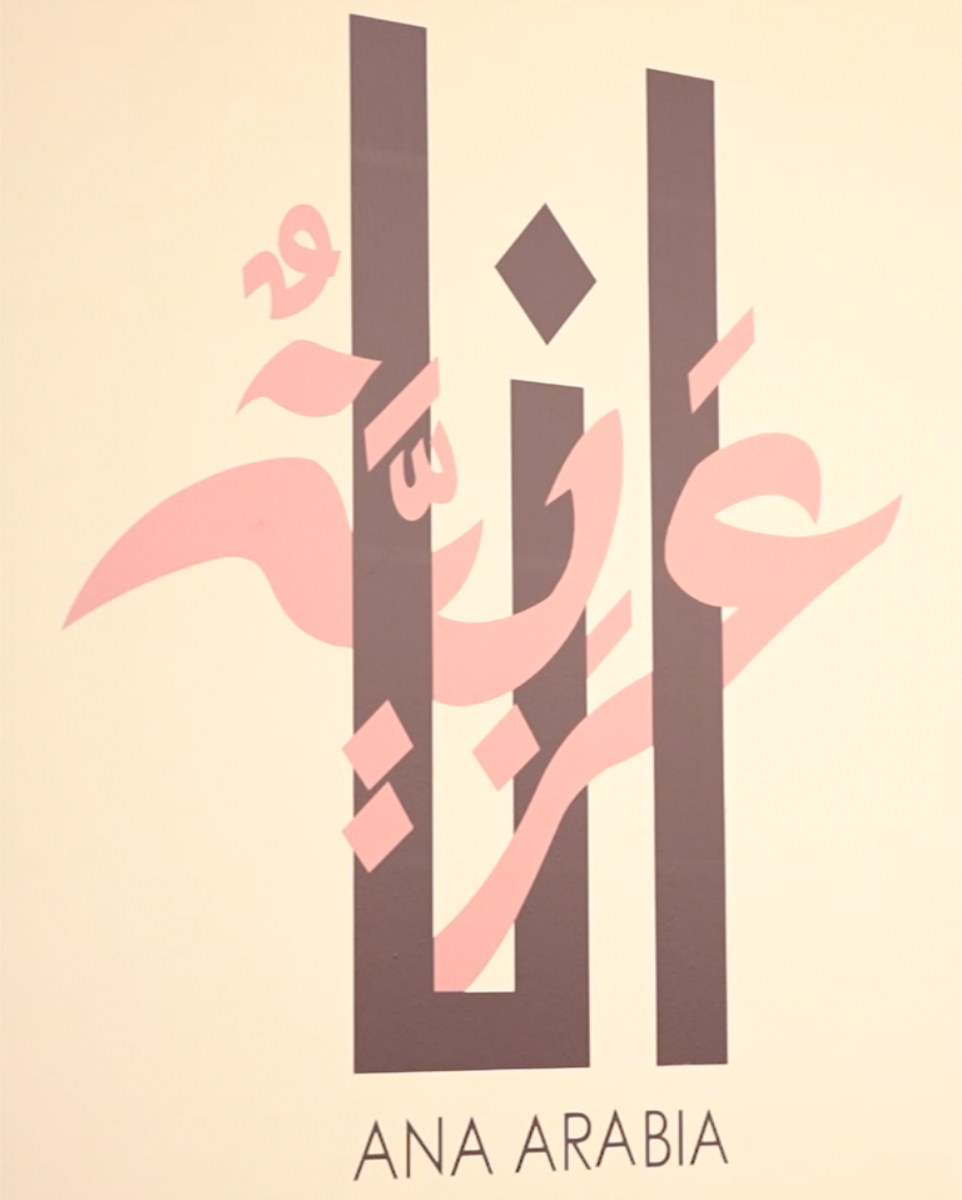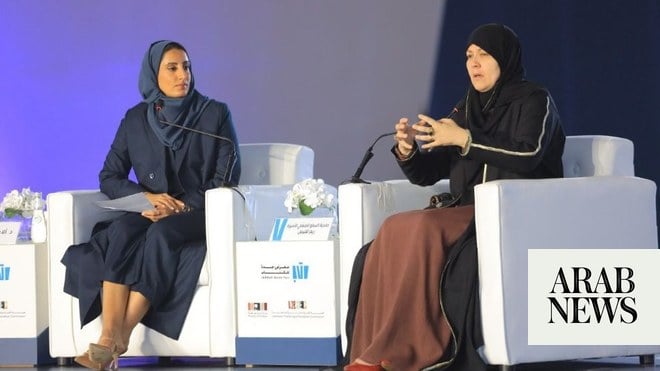https://arab.news/4kmf7
JEDDAH: On Monday night a panel discussion took place at the 2022 Jeddah Book Fair entitled “Technology, Imagination and the Marketing Game: Future Alliances: NFTs / Web3 / Metaverse.”
While the crypto sphere continues to blur the lines between the virtual and physical worlds, Princess Reem Al-Faisal agreed that these technologies, the Web3 ecosystem, nonfungible tokens and the metaverse are well-positioned to dictate the future of the former.
She said blockchain technology, which is for storing information in a decentralized way and keeping it more secure, is an upcoming knowledge.
Al-Faisal said that she is fascinated by cryptocurrencies and bitcoin, which she called “the most amazing technology revolution.”
While facing the audience, Al-Faisal, a photographer for more than 30 years, then moved on to defining the “Infinity” technology, which is non-fungible and divisible symbols, and explained its most common uses in artworks and digital contracts.
She also mentioned that this technology allowed artists to enter the digital world, such as stereo arts and paintings, to have their creations bought and sold.
“It is also used in real estate because it uses indivisible symbols, and its advantage is that all information that is put in the contract remains preserved and continues until death.”
Regarding the metaverse, Al-Faisal indicated that it is technology beyond reality, and the city that contains all other digital construction.
“While Web3 is a new generation of the internet, we started with it, but we are not going to use it, because it needs public adoption.”
She added: “We use the blockchain in our dealings by 99 percent, in banks, various investments, and commercial opportunities. There are platforms that use this technology, including OpenSea, Foundation and Rebels, and it is also used in marketing for business and exhibitions. The platform that most supports this technology is Twitter.”
She indicated that the metaverse will change many things in several fields, including banking, as institutions will dispense, for example, with physical branches, as well as in medical services, which use the triple dimension, and universities that will use it for distance learning.
“The most critical challenge of these technologies is a lack of knowledge. So, individuals who will deal with these techniques should study them well, and take their time to learn, as they need at least 150 hours to be familiar with all fields because one of the risks is that those who don’t study this field will fall into identity theft and scams, for example,” She concluded.
RIYADH: Saudi Arabia’s Global Center for Combating Extremist Ideology is planning to expand its work with the United Nations Counter-Terrorism Center to combat violent agitators worldwide.
Mansour Al-Shammari, Etidal’s secretary-general, held discussions on Tuesday in Riyadh with Vladimir Voronkov, under-secretary-general of the UNCCT, on various joint measures, including the adoption of advanced technology.
Voronkov, in a media statement, said: “The Kingdom of Saudi Arabia is a pioneer in the field of combating extremism at the local and global levels and will continue its pioneering efforts in this regard in the coming period because extremism is a continuing threat.”
He added that no country was immune to terrorism. “Therefore, international cooperation is an important factor for success in this matter, and this region is very important to us.”
In April 2022, Etidal and the UNCCT signed a memorandum of understanding to tackle the scourge.
Regarding the MoU, the UNCCT’s Director Jahangir Khan said: “We are working on developing cooperation programs that will have a global aspect, especially in the most important matters such as research and development, and we are very much looking forward to developing more programs in this memorandum of understanding.”
Raffi Gregorian, deputy to Voronkov, said during his visit to Etidal: “It is really great to be here in person and really excited about some of the things we learned today, about the ways in which we can take cooperation to the next level. And helping many other member states deal with these problems.”
RIYADH: Business France, the agency supporting economic development initiatives, held a special equestrian event here to seek partners in Saudi Arabia for its equine industry.
The “French Equestrian Day” in Riyadh from Dec. 12 to 14 saw the participation of several of the European nation’s firms and government entities, including over 10 equestrian companies and those in charge of megaprojects.
Organized for the first time in the Kingdom, the event was inaugurated by the French Ambassador to Saudi Arabia Ludovic Pouille. It was held in line with the goals of the Saudi Vision 2030 to promote healthy and active lifestyles.
On the first day, the Ministry of Sport, the Saudi Equestrian Federation, the Sports Boulevard Foundation and the Equine Hospital in Riyadh presented their strategic objectives.
The director of the Jockey Club, Salem bin Mahfouz, explained how international standards should be adopted and applied in horse racing management. In comments to Arab News en Franҫais, and welcoming the experts, he said France had “expressed its wish to be part of this project.”
Cecile Tardieu, director of Business France Invest, underlined the importance of the mission of the agency, which was to increase exports and attract investments.
Tardieu said France has an established equestrian industry, and has since January 2019 entrusted private partners with supporting small- and medium-sized equestrian businesses worldwide.
Tardieu told Arab News en Franҫais that this partnership project was decided a year ago during the Dubai World Expo. She recognized the potential of the Saudi market and the interest shown by the Kingdom’s authorities to develop sport, including the equestrian industry.
Jean Roch Gaillet, director general of the French Institute of Horse and Riding, said the industry was worth EUR2.5 billion ($2.6 billion) in 2022, providing 22,287 fulltime jobs, and 24.5 percent of total exports.
Among the entities that participated included Pole Hippolia, the only state-certified competitiveness cluster dedicated to the equine sector. Based in Normandy, it brings together a network of more than 210 members throughout France, including business creators, startups, small and medium businesses, research teams, training establishments and institutions.
Other companies present included Antares Sellier, European Horse Services, Equ’Institut, Equi-rider, Equiways, Fornells, Franquet, Gregori International and Labeo, who came specially to Riyadh to showcase their skills in the field.
Arab News en Franҫais also spoke with Ismail Himdi, exclusive representative of Gregori International, which specializes in the development of training grounds and outdoor stadiums. Himdi said “the Saudi market presents a lot of opportunities.”
DUBAI: Saudi Arabia’s Global Center for Combating Extremist Ideology (Etidal) received on Tuesday a delegation from the UN Center for Combating Terrorism (UNCCT).
Mansour Al-Shammari, the Secretary General of Etidal, briefed the delegation led by Undersecretary-General of the UNCCT Vladimir Voronkov on the organization’s efforts in combatting extremist ideology, state news agency SPA reported.
Al-Shammari shared some of the social initiatives executed by Etidal, which Voronkov praised for its pioneering role in fighting terrorism both on a regional and international level.
RIYADH: From Algerian singer Cheb Mami’s feature on Sting’s “Desert Rose” in 1999 to Marshmello’s 2022 collaboration with Lebanese songstress Nancy Ajram, Arab nuances have been slowly weaving their way into the fabric of Western music.
However, Arab women remain on the sidelines of the industry, with only a handful of prominent acts making waves.
In Saudi Arabia, Spotify’s annual Wrapped campaign revealed that no female musicians from the Kingdom made it onto the country’s top 10 streaming artists’ list, and only three Khaleeji tracks, two of them by Syrian artist Assala Nasri, were most streamed.
But with the regional music scene predicted to become the fastest growing in the world, Arab women are aiming to buck the trend through authenticity.
At the recent XP Music Futures conference, industry experts and artists shared their thoughts on projecting women on a global stage.
Palestinian Chilean singer Elyanna has quickly made a name for herself globally, and has captivated audiences with her mane of dark blonde curls and piercing green eyes.
Supported and discovered by Lebanese Canadian musician Massari and The Weeknd’s manager Wassim “Sal” Slaiby, she now has more than 400,000 monthly listeners on Spotify.
Her sensual vocals and contemporary lyrics appeal to the masses as she bridges cultures in a way that is authentic yet mainstream and she is quickly becoming the voice of a multicultural generation.
As opposed to many other upcoming artists, Elyanna remains distinctly an Arabic lyricist, incorporating her Palestinian roots into creating a unique genre of her own.
She told Arab News: “When I work on my music, I don’t think of it like, ‘oh, let’s do something crazy.’ I think of it as me. I’m 20 years old, and I just do what feels right to me.
“So of course, the generation is going to get that, because they’re going to connect with how a 20-year-old girl feels.”
The beauty about songs is they don’t look at if you’re male or female. Songs are songs. It starts with great songs.
Matthew Knowles
While she noted that she was too young to give advice on navigating the challenges that come with being a woman in the industry, she highlighted the word try within all her aspirations.
Elyanna said: “When you care, and you’re passionate, that’s all you need. I believe that Arab music is going to have an impact one day. It’s not going to be easy, obviously, nothing comes really easy. I do think our culture is so beautiful, there’s so much that the world did not see about our culture.
“Imagine we show them our dancers, the way they dance; so authentic, so beautiful. And look at the instruments we have, the melodies we have, the beats. You see a lot of Americans; they take them and make them hip hop beats. This says so much. This is such a start,” she added.
Mathew Knowles, the visionary manager behind the careers of Destiny’s Child, Beyonce, and Solange, the latter two to whom he is the father, spoke about how to be a successful female act in the global market. He said that while 75 percent of his clients over the years had been women, image was key in the music industry.
“The beauty about songs is they don’t look at if you’re male or female. Songs are songs. It starts with great songs.
“I wanted to also understand that with the culture, will the youth be able to look contemporary in their dress and can women be contemporary in their dress? Because if you’re going to compete against the world, that’s what you’re competing against, right?”
He added that language was also something to take into consideration; would an artist be singing solely in Arabic, English, or both?
Knowles said: “How are you going to approach the language barrier if you’re going to grow?”
Hailing from the region’s biggest rap scene, Egyptian musician Felukah has been flipping the concept of Arabic hip hop.
Inspired by global prose and poetry from the likes of poet Nayyirah Waheed and Japanese writer Haruki Murakami, her intriguing lyrics find a way to adapt to the nature of rap and hip hop music by mixing Arabic and English lyrics.
Felukah told Arab News: “What I’m really trying to do is represent myself in the most authentic way possible. And when people find that relatable, they like the music.”
She recently released Coca Cola’s 2022 FIFA World Cup anthem, an all-girl collaboration with Saudi musician Tamtam and Mexican singer Danna Paola, remaking Queen’s 1986 hit “A Kind of Magic,” and gave a captivating performance at XP Music Futures in November.
On her experience being a woman in the industry, Felukah said: “I get hate from men, and I get hate from women. A lot of the time I hear, ‘I don’t like women rapping, I like male voices.’
“That’s not a critique. You need to expand your range. You need to listen; there’s so many women rappers, there’s so many women singers, and the fact that a person is not familiar enough with women’s voices and hasn’t found at least one that they like is wild. So, I don’t accept that,” she added.
She noted that authentic Arabic music will not rise to the top in one song, but contemporary artists today, including herself, were working toward representation in a brighter future.
RIYADH: The third Ana Arabia, or “I am an Arab Woman,” show launched on Saturday here highlighting the work of some of the region’s leading creatives.
Several Arab women designers showcased an array of products including jewelry, accessories, shoes, bags and perfumes. The show will run until Dec. 16 at Riyadh Front.
Over 200 creatives from across the Arab world are participating, with pavilions featuring Saudi Arabia, the UAE, Kuwait, Qatar, Bahrain, Lebanon, Jordan, Egypt, Oman, Yemen and Iraq.
The Kingdom’s pavilion features Saudi brands Charmaleena Jewelry and Cle, with its collection of rare pieces and watches from around the world.
Several Saudi designers displayed their winter fashion designs including abayas and farwas, which is a long fur coat.
Designer Zaina Elyas told Arab News she came from Jeddah to share her work. “My abayas are inspired by the elegant and independent Saudi women, and what I offer is styles that highlight that side.”
I remember the scent that my grandmother used to wear and I developed one of my perfumes in a way that we can still have the same feeling when we smell the perfume.
Mashael al-Kuwari
Designers from Qatar showcased their skill and experience in perfume-making, including Mashael Al-Kuwari, the owner of Mirwad, who says she alludes to the power of memory and being young through her creations.
“I remember the scent that my grandmother used to wear and I developed one of my perfumes in a way that we can still have the same feeling when we smell the perfume. However, it’s a new scent, it’s something niche and different.”
She said her journey started when she enrolled at the Grasse Institute of Perfumery in France. “My favorite perfume I would say is Beach Rose because it was inspired from the traditional Qatari bride.”
Al-Kuwari explained that in Qatari culture when a woman gets married, she is given this specific scent for her dazzah, which is the gifts she receives as part of her wedding preparation. “It’s a very unique and sharp smell. It’s something that tells people I am here, I am in this place.”
International fashion designer from Bahrain Kubra Al-Qaseer who has been in the industry for 30 years, shared her latest winter abaya collection made of velvet. “This is my third year participating in Ana Arabia. It is the largest exhibition for fashion in the Gulf, not just Saudi Arabia.”
She added that she has been participating in major fashion exhibitions and events for 20 years, and enjoys traveling to Riyadh to tap into the fashion sense and taste of Saudi women.
Jewelry designer Nujud Al-Saadawi, who has become relatively well-known in the industry after only two years, said she has her creations produced at factories abroad.
It takes about two months to produce a piece, which often includes precious stones, gold-plated silver and copper.
Al-Saadawi said that Riyadh Season has given her considerable prominence, and remains an important event for empowering Arab women from around the world.
Guests at the event include international fine-dining restaurants such as Meraki restaurant offering Greek cuisine, and London’s A.O.K. serving Mediterranean dishes. Specialist coffee for visitors is offered by Eclat, Elba, EL&N, and Oak Leaves.


